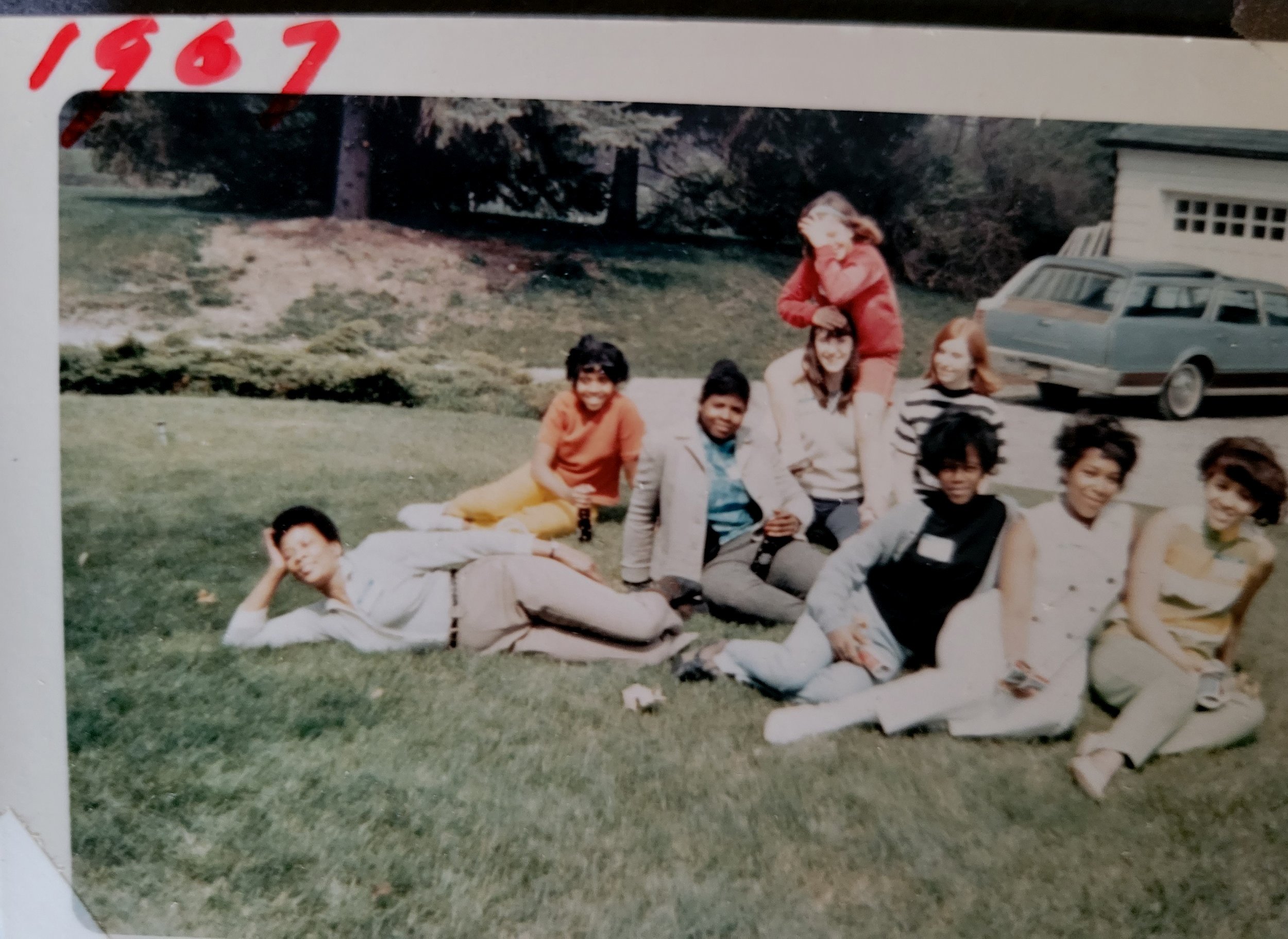
LESSON PLAN #1
The Freedom To Have Fun
A lesson From the Life of Sarah E. Ray
© Last Straw Ventures, 2022
Lesson Plan and Discussion Guides
Click here to download a PDF of the lesson plan and discussion guide.
Click here for a printer friendly version.
Click here for a student worksheet with discussion quesions.
Sarah’s Testimony
Click here for a printer friendly version of Sarah's testimony
Lesson #1 Overview
In 1948, a young, black woman in Detroit won a major civil rights case in the United States Supreme Court. History has forgotten Sarah Elizabeth Ray’s fight for equal access to summer fun, even though her case was a critical steppingstone to ending legal segregation in the United States.
In this lesson, high school students will learn about Sarah Ray’s story, and consider what it means to be banned from fun based upon skin color. In considering whether such barriers still exist, students will learn about the power of allyship as a modern tool of social change.
Social Emotional Learning Competencies
1. Self-awareness
The ability to accurately recognize one’s own emotions, thoughts, and values and how they influence behavior. The ability to accurately assess one’s strengths and limitations, with a well-grounded sense of confidence, optimism, and a “growth mindset.”
2. Self-management
The ability to successfully regulate one’s emotions, thoughts, and behaviors in different situations — effectively managing stress, controlling impulses, and motivating oneself. The ability to set and work toward personal and academic goals.
3. Social awareness
The ability to take the perspective of and empathize with others, including those from diverse backgrounds and cultures. The ability to understand social and ethical norms for behavior and to recognize family, school, and community resources and supports.
4. Relationship skills
The ability to establish and maintain healthy and rewarding relationships with diverse individuals and groups. The ability to communicate clearly, listen well, cooperate with others, resist inappropriate social pressure, negotiate conflict constructively, and seek and offer help when needed.
5. Responsible decision-making
The ability to make constructive choices about personal behavior and social interactions based on ethical standards, safety concerns, and social norms. The realistic evaluation of consequences of various actions, and a consideration of the well-being of oneself and others.

LESSON PLAN #2
THE HOUSE THAT CHANGED LIVES
A LESSON IN SOCIAL ACTION
© Last Straw Ventures, 2022
Lesson #2 Overview
There's an old saying: Think globally, act locally. That means that in order to be an agent for global change, you can start by making a positive change in your own backyard. In other words, think big, but take small steps. After Sarah Ray fought to end segregation on the national level, she devoted the remainder of her life to community activism in her own Detroit neighborhood.
In this lesson, high school students will learn about Sarah Ray’s neighborhood empowerment organization, Action House, and the lives she touched. Students will consider the different forms activism can take and investigate the meaning of self empowerment.
Lesson Plan #2 and Discussion Guides
Click here to download a PDF of the lesson plan and discussion guide.
Click here for a printer friendly version.
Click here for a student worksheet with discussion quesions.
CHILDREN OF ACTION HOUSE VIDEOS
Click here to watch oral histories from the “Children of Action House” and hear first hand how their lives were changed
ADDITIONAL RESOURCES
Still from short film Detroit's Other Rosa Parks - directed by Aaron Schillinger
In Her Own Words: Testimony of Sarah Ray about the Incident on the SS Columbia
“My name is Sarah Elizabeth Ray and I live at 234 Eliot Street, Detroit, and I have been employed by the Detroit Ordnance District since last May. I have lived in Detroit for ten years. Previous to June 21, 1945, about forty girls, all classmates from Commerce High School, planned to take a trip to Bob-Lo Island. This trip was sponsored by the Detroit Ordnance District who conducted a class at said school.
On the morning of June 21, only thirteen girls showed up at the foot of Woodward Avenue in Detroit to go on said trip. I was the only colored girl among them. [fol. 9] The other girls were white. When we arrived at the dock, we each paid eighty-five cents to Phyllis Walton, one of the girls in the group, to secure the boat tickets. She purchased the tickets and passed them around to the other twelve girls. I did not bother to read what was on my ticket.
The twelve white girls and I got on the boat together. On the way to the boat we passed through a gate. The ticket taker accepted my ticket. No one said anything to me while getting on the boat. We checked our coats, went up on the top deck and sat down. We boarded the vessel Columbia for the trip to Bob-Lo Island, which is owned and operated by the Bob-Lo Excursion Company.
Still from short film Detroit's Other Rosa Parks - directed by Aaron Schillinger
Shortly afterwards two men, one dressed in uniform and one in plain clothes, came toward where we were sitting. We were not creating a disturbance at the time. They asked one of the white girls in our group, Rita Esper, sitting next to me if she knew me. The men were Mr. Robert E. Devereaux, assistant general manager of the Bob-Lo Excursion Company, and Mr. George Fox, a steward employed by said company. Miss Reed, our teacher, asked these men what they wanted, and they asked her if she knew me. They said I could not go along with the girls because I was colored. When I told my teacher, they were discriminating against me, both Mr. Devereaux and Mr. Fox got angry and told me I would have to get off the boat.
They stood over me and argued. My teacher got excited and I walked away because I was embarrassed. Mr. Devereaux and Mr. Fox yelled at me and said I was going in the wrong direction to leave the boat. I told them I was not leaving the boat and they ran and jumped in front of me. One of them called to three white men in white uniforms, waiters in the restaurant, [fol. 10] and told them “to throw this woman off,” and they all closed in on me and got excited.
Still from short film Detroit's Other Rosa Parks - directed by Aaron Schillinger
I then told them I would leave the boat. Mr. Devereaux and Mr. Fox escorted me off the boat. Both of them told me I couldn’t go on the boat because I was colored. While I was being led off the boat they told me I didn’t have any right on the boat because it was a private concern and they could keep me off if they wanted to.
They took me to the ticket office and offered to return my eighty-five cents back but I would not accept it. After I took the names of Mr. Devereaux and Mr. Fox, I left the premises of the Bob-Lo Excursion Company.
I intended to have the boat take me to Bob-Lo Island. I am a negress, was born in Tennessee and have lived in Detroit for ten years.”
From:Testimony of SER upon direct examination by Joseph L. Bannigan, Asst. Prosecuting Attorney for the People of Michigan, Transcript of Record, Supreme Court of the United States, October Term, 1947, No. 374, Bob-Lo Excursion Company, Appellant vs. The People of the State of Michigan, Appeal from the Supreme Court of the State of Michigan, Filed September 26, 1947, pp. 3 – 5.









